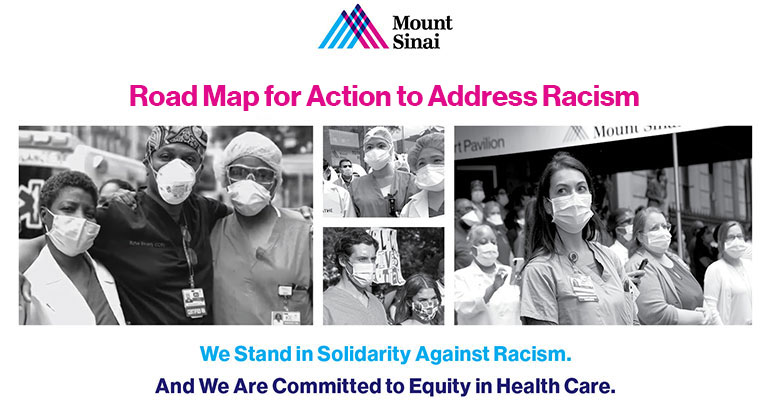
A Road Map for Action
As of July 2021
A Legacy of Serving
For over 200 years, the mission of the Mount Sinai Health System has been to serve all our communities, but especially those ignored, oppressed, or facing bias. We have a strong moral and ethical foundation, and we have been a leader in gender equity and racial diversity, equity, and inclusion. This is who we are and where we come from.
As we face today’s challenge of grappling with the history of social and systemic racism, we have a unique opportunity to improve our system and enhance the care we give. We are poised to be true leaders in this.
In the wake of George Floyd’s death and a surge of support for the Black Lives Matter movement, Kenneth L. Davis, MD, President and Chief Executive Officer, and Dennis S. Charney, MD, Dean of the Icahn School of Medicine at Mount Sinai, commissioned a task force on racism to take a hard look at our organization. The Task Force was chaired by Gary Butts, MD, Executive Vice President for Diversity, Equity, and Inclusion.
Our Task Force was made up of 51 members from our community, who worked together with a singular focus in fall and winter 2020. It included a cross-section from across our organization—front-line staff members, students, hospital presidents, and board members—to provide an authentic mix of perspectives, voices, opinions, and ideas.
What Was the Task Force’s Charge?
“Evaluate, investigate, and engage in meaningful and sustained action and dialogue; and report back to leadership with specific recommendations that move the system forward to ensure a more fair, just, anti-racist, and equitable community for its staff, patients, and students.”
Summary of Strategies
Learn more about the Mount Sinai staff members leading implementation of the 11 Road Map strategies
Measurement
Strategy 1 (lead: Doran Hicks): Develop an equity scorecard to measure performance in order to identify where we are meeting with success and where more or different efforts are needed.
Health Care Delivery
Strategy 2 (lead: Jeremy Boal): Unify and integrate clinical practices, where possible, while advocating for payment and regulatory reforms that would allow for the full integration and unification of clinical practices regardless of insurance status.
Community Engagement
Strategy 3 (lead: Emma Palmer): Enhance community partnerships and accountability.
Strategy 4 (lead: Pamela Abner): Build connection and community within the MSHS to adopt a racial equity culture.
Strategy 5 (lead: Gary Butts): Forge new, and leverage existing, strategic partnerships and networks within the MSHS to accelerate and spread anti-racism and equity efforts.
Finance and Business
Strategy 6 (lead: Stephen Harvey): Develop a sustained financial investment in racial equity and anti-racism.
Strategy 7 (lead: Jeff Silberstein): Examine and redesign business structures with an anti-racist and equity lens.
Organizational and Institutional
Strategy 8 (lead: Jane Maksoud): Increase recruitment efforts, hiring, and retention of Black and other underrepresented minority (URM) staff and faculty and ensure they are represented in all levels of leadership, including high-impact leadership roles in the System.
Strategy 9 (lead: Diane Adams): Promote equity in mentorship.
Learning and Enrichment
Strategy 10 (lead: Art Gianelli): Enhance leadership learning, capacity, knowledge, engagement, and accountability so that all leaders are able to participate fully in anti-racism and equity efforts.
Strategy 11 (lead: Ann-Gel Palermo): Provide anti-racism education and resources throughout the MSHS in order to foster a learning community at all levels and to help advance an anti-racism and equity culture.